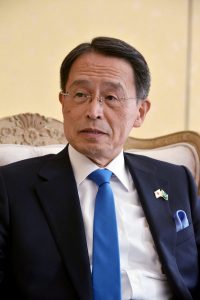TAKASHI KURAI: Japan to continue supporting Pakistan for its stability and development

Ambassador of Japan talks to CENTRELINE and Diplomatic News Agency (DNA)
Ansar Mahmood Bhatti
- As we know, Japan remains one of the major bilateral development partners to Pakistan. Can you please highlight some salient features of this cooperation?
Before anything, I should like to make sure that the very basis of Japan’s assistance to Pakistan is a notion that its stability and development is important not only for Pakistan but also for the whole region of South Asia and beyond. I believe that no one would deny the significance stemming from its geographical location of the country.
On that basis and with sincere hope for the stable and harmonised development of Pakistan, Japan’s ODA assistance policy consists of 3 pillars; First, improvement of economic infrastructure.Second, ensuring human security. Third, improvement of social infrastructure and balanced and stable development including the border region
The need for the first pillar, improvement of economic infrastructure, such as power supply, road network etc., is obvious as the very basis of economic development.
The second one, ensuring human security, is a principle where we attach utmost importance to the improvement of life of each and every individual. For that we need to improve water & sewerage system, support polio eradication, strengthen weather forecasting, support basic education and technical & vocational training, etc. All these are the fundamental elements for ensuring human security.
The third pillar, improvement of social infrastructure and balanced and stable development including the border region, means that we put priority on, and should never underestimate the need of, the development of the border area. It is also important for security of the whole country as well.
I would also like to emphasize that we are supporting Pakistan not only by building infrastructure or providing some materials but also by human resource development through dispatching Japanese experts to Pakistan and receiving Pakistani people as trainees in Japan, which, we believe, facilitates transfer of Japanese technology to Pakistan.
- Japan has been supporting Pakistan’s economic and social development for many years. Can you share more details about this cooperation focusing on quality growth, human development, health systems, education, disaster management etc.
The followings are the examples of our support which we have been doing since 1950’s. But here I would like to reiterate that all we have been doing is based on the recognition of the importance of Pakistan which has a huge potential for development of its own and at the regional level as well.
1) Quality growth
Due to the sharp curves and narrow width of the road, the border section of National Highway 70, connecting Punjab and Balochistan, creates some bottleneck to the traffic. In order to solve this problem, 16 billion Yen Loan has been provided and Japanese advanced technology is being applied for the construction. The interest rate is about 0.2% for 40 years of repayment with 10 years of grace period.
Kohat tunnel, which was completed in 2003 through 12.6 billion Yen Loan is one of the symbolic projects for the friendship between Japan and Pakistan. National highway 70 will surely become another symbol of our friendship.
2) Human development
Having over 200 million of population and 63% of the whole population being under 30 years of age, human resource development is of critical importance to Pakistan, not only for its economic development but also for the young generation to remain an integral part of the community and to be kept away from extremism. On that basis, Japan gives priority to assistance to education.
The statistics show us that in Pakistan there are around 52 million children from 5 to 16 years of age, out of whom 44% or around 23 million do not go to school, and this figure is the second largest next to Nigeria. In Pakistan, for children, once dropped out of public school system, it’s difficult to get back to it. By way of supporting the people who make great efforts to improve the situation, Japan has been assisting “Non-formal Education”, by which children are given access to the basic, if not complete, education.
Technical education and vocational trainings is another area where we believe we can do something to support. Construction Technology Training Institute, known as CTTI, established in 1986 by Japan’s grant aid, has been providing continuous support and it is, as we believe it, one of the symbolically successful Japanese assistance. The graduates of CTTI find jobs at the major companies such as Indus Motor, Atlas Honda, NHA etc. Here we expect technology transfer as well.
3) Health care
Pakistan’s health indicators, including under-five mortality rate and maternal mortality rate, are lower than those of other South Asian countries. So maternal and child health sector are another important area of Japan’s assistance in Pakistan.
Pakistan Institute of Medical Sciences, known as PIMS, is one of the public hospitals which provides high level medical service, research and education. Japan has been supporting PIMS since 1982 for the construction of Children’s hospital, Maternal & Child Health Care Center and College of Nursing and College of Medical Technologies through around 11 billion Japanese yen of grant aid in total and human resource development by technical assistance.
What should not be forgotten is that, unfortunately, Pakistan is one of the 3 endemic countries of poliomyelitis. Japan has been supporting the polio eradication program in Pakistan since 1996 and the total amount of assistance has reached around 24 billion Japanese Yen. Through the commitment by the Pakistani government and the support by the international community including Japan, the polio cases have dramatically decreased to 3 cases in 2018 as of today from 1,500 cases in 1996. Japan continues to support polio eradication program in Pakistan until the notorious virus will be vanished.
4) Disaster Management
Pakistan is susceptible to natural disasters. We remember well the flood in 2010, one of the most severe ones in Pakistan’s history which claimed the lives of more than 2,000 people and caused damage to more than 20 million people. Japan is also prone to natural disasters like typhoon, earthquake, flood and so forth. It is unfortunate that we both are susceptible to natural disasters but fortunate that we can share the experiences and learn lessons from the other.
One of the keys for decreasing the damage resulting from natural disasters is to be well prepared for them. Taking this in mind, Japan has been supporting Pakistan to strengthen its weather forecasting capability. Currently there are 7 weather radars in Pakistan, out of which 4 radars, in Islamabad, Karachi, Dera Ismail Khan and Rahim Yar Khan, were established by Japan’s grant aid.
Those 4 radars established by Japan’s grant aid cover 80% of the country and 90% of the population. Now, we are going to provide another grant aid assistance for the installation of a new radar in Multan, which will become the fifth radar established by Japan’s aid out of 8.
I strongly believe that those assistance will further augment the capacity of weather forecasting of Pakistan and sincerely hope that the casualties out of natural disasters will substantially decrease.
(3)Security and climate change are yet another sphere where Japan has been supporting Pakistan. Please share more details for our readers.
1) Security
Security is the very basis of human life and a critical element for the economic development as well . It is also one of the most important factors to attract investment from other countries.
I would like to appreciate the drastic improvement of the overall security situation in Pakistan in recent years and also the efforts made by the military and law enforcement forces to fight against terrorism at the cost of their valuable lives.
To support all these efforts of Pakistan, Japan has been contributing to improvement of border management, providing security equipment, including X-ray scanner, to the major airports in Pakistan such as Islamabad, Lahore, Karachi, Multan and Faisalabad, and also to the seaports of Karachi and Bin Qasim with 5 billion Japanese Yen of grant aid assistance in total.
In addition to that, Japan has been supporting the anti-narcotic measures together with international organizations in order to cut off the funding sources of transnational organized crime.
2) Climate change
Flood is one of the major concerns in Pakistan. Due to rapid population growth and urbanization, cities in Pakistan are especially vulnerable to flood. Actually the most severe flood in 2010 was followed by other floods in some cities of Pakistan.
Strengthening of the weather forecasting system, which Japan has been doing, is one of the most important ways to mitigate the damage incurred by climate change in Pakistan.
Besides this, improving of the drainage system is also very important for mitigation of the damage and Japan has been doing rehabilitation of drainage pumps and providing excavators for dredging for the cities of Lahore, Gujranwala and Faisalabad to strengthen the drainage capacity,
- As you said in one of your speeches that cultural and human exchanges are the very foundation for the relationship from a long term perspective. Will you please elaborate this point with reference to Japan- Pakistan relations?
The very foundation of state-to-state relationship is the relationship of the people by which the state is made. So in the long run, people-to-people relationship is the key. It relates to culture, religion, history and so forth.
Japan and Pakistan are geographically far from each other and the way of living is not the same but there are aspects in Pakistan which we respect and those in Japan which, hopefully, Pakistani people respect. Those are exactly the very basis of our people-to-people relationship and I would like to emphasize that the mutual respect is the key.
To touch upon actual exchanges between us, every year we send *MEXT scholarship students from Pakistan to Japan. MEXT scholarship is not only educational one, but also includes 6 month intensive Japanese language and culture study course. In the MEXT scholarship program students are enjoying Japanese culture and lifestyle besides studying their major academic themes.
MEXT alumnae are organizing MAAP which is called MEXT alumnae association. MAAP extends support to the Embassy of Japan at various cultural and educational events. Whenever I met MAAP members, I am always pleased to hear about their vivid memories of their University days in Japan. We offer 2 or 4 years of scholarship, and after coming back from Japan, alumnae are continuously supporting activities for friendship between Japan and Pakistan.
Besides MEXT scholarships for research scholars, there are undergraduate students and teachers training programs. Also the government of Japan invites civil servants from Pakistan every year under its Young Leaders Program. One of the very recent and unique exchange programs is “Sakura Exchange Program in Science” where students, majored in science and technology, are invited to Japan for study tour on short duration. Recently students from NUST visited Japan under this program and they have given a very positive feedback upon their return to Pakistan.
We hold flower arrangement events at my residence on annual basis. Last year I held Ikebana event in collaboration with Floral Art Society of Pakistan. Ikebana is traditional Japanese art of flower arrangement. During that event Japanese Ikebana teacher showed how best to arrange the flowers in accordance with the ways established in the long history of its art in Japan and the members of floral society also demonstrated their arrangements inspired by Ikebana. It was wonderful cultural collaboration between Japan and Pakistan. We fully enjoyed that event.
All these activities are rather small in their scale but we believe that they are slowly but steadily creating the very foundation of the relationship between our people based on mutual interest and respect.
(*Scholarship of Ministry of Education, Culture, Sports, Science and Technology –Japan)
(5)How do you see the security situation in Pakistan nowadays? Do you think peace in the region (Pakistan, Afghanistan, India) is a must for regional development?
As I mentioned earlier, Japan deeply appreciates Pakistan’s efforts to fight against terrorism and I would like to express my heartfelt condolences to the victims and the bereaved families who have suffered immensely in this war against terrorism and also pray for the earliest recovery of those injured. Also as I said earlier, Pakistan’s location is geopolitically very important and its security situation as well as a stable economic development is one of the key factors for stability of the whole region.
(6)Japan is not part of CPEC, however you must be following CPEC related developments keenly. What is your assessment of this initiative?
As a long-term friend of Pakistan, Japan supports and wishes to contribute further to the development of Pakistan. In this respect, Japan sincerely hopes that the CPEC projects are to be implemented for the benefit of Pakistan and believes at the same time that for the CPEC to be fully beneficial to Pakistan, they should be based on principles of transparency, economic viability, rule of law, following the international standards.
Related News

‘Taste the World’ food festival at Serena Hotel
Aziz Boolani, CEO Serena Hotels said, our commitment to cultural diplomacy extends beyond hospitality, itRead More

Direct flights between Pakistan and Morocco need of the hour
Tourism is a very important sector in Morocco in which Pakistanis can invest: Mohammad KaramoneRead More




Comments are Closed